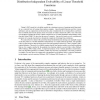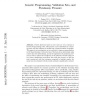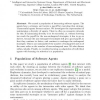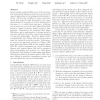112 search results - page 22 / 23 » Evolutionary model selection in unsupervised learning |
CORR
2011
Springer
13 years 2 months ago
2011
Springer
Valiant’s (2007) model of evolvability models the evolutionary process of acquiring useful functionality as a restricted form of learning from random examples. Linear threshold ...
CORR
2006
Springer
13 years 7 months ago
2006
Springer
Fitness functions based on test cases are very common in Genetic Programming (GP). This process can be assimilated to a learning task, with the inference of models from a limited n...
AAMAS
2002
Springer
13 years 7 months ago
2002
Springer
We control a population of interacting software agents. The agents have a strategy, and receive a payoff for executing that strategy. Unsuccessful agents become extinct. We investi...
NECO
2011
13 years 2 months ago
2011
Selection of an optimal estimator typically relies on either supervised training samples (pairs of measurements and their associated true values), or a prior probability model for...
SDM
2011
SIAM
12 years 10 months ago
2011
SIAM
Latent semantic analysis (LSA), as one of the most popular unsupervised dimension reduction tools, has a wide range of applications in text mining and information retrieval. The k...




